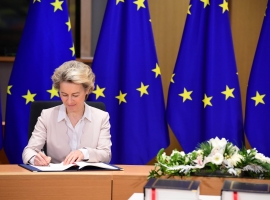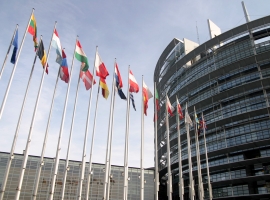
Europe's medicines regulator on Monday approved the use of the COVID-19 vaccine jointly developed by U.S. company Pfizer and its German partner BioNTech , putting Europe on course to start inoculations within a week.
European Union countries including Germany, France, Austria and Italy have said they plan to start vaccinations from Dec. 27 as Europe tries to catch up with the United States and Britain, where inoculations began earlier this month.
Having gained the green light from the European Medicines Agency (EMA), the final step is approval by the European Commission, which is expected later on Monday.
"Now we will act fast. I expect a European Commission decision by this evening," Commission head Ursula von der Leyen wrote on Twitter.
Von der Leyen had already targeted the start of vaccinations over the Dec. 27-29 period.
Preparations for the vaccine rollout come as the identification of a highly infectious new strain of the coronavirus in Britain caused chaos across the region, with countries shutting off travel ties with the UK and disrupting trade ahead of the Christmas holiday.
EMA officials told a news briefing that it was highly likely the vaccine would work against the new variant of the coronavirus.
The pandemic has killed about 470,000 Europeans and is picking up pace in the winter months, crushing economies in the process. Many governments have imposed tighter restrictions on households to try to curb a second wave of infections and avoid overwhelming healthcare systems.
Student medics, retired doctors, pharmacists and soldiers are being drafted into a European vaccination campaign of unprecedented scale.
A phased-in approach means frontline healthcare workers and elderly residents of care homes are being prioritized, with most national schemes not reaching the general public until the end of the first quarter of 2021 at the earliest.
The goal of the 27-member EU is to reach coverage of 70% of its 450 million people.
The drugs regulator in Switzerland on Saturday authorized the vaccine for use in people aged over 16.
The EMA had started a rolling review of preliminary data from Pfizer trials on Oct. 6 in an effort to speed an approval process that usually takes at least seven months.
The EMA clearance, initially granted as conditional marketing approval (CMA), is valid for one year and can be renewed annually. It can be converted into a standard marketing authorisation after further data checks. This would be valid for five years but can be renewed for unlimited validity.
The process took longer than the ultra-fast emergency authorisation given by Britain, the first western country to endorse a COVID-19 shot. (Reuters)
Source: www.businessworld.ie

















